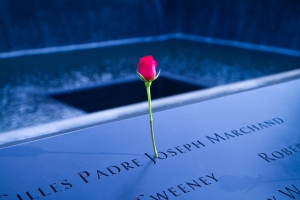Good Will Hunting: U.S. Public Diplomacy Since 9/11
“The window for diplomacy is closed.” So said President George W. Bush as the U.S. prepared to launch military action in Iraq. Mr. Bush intended that statement as a message to Saddam Hussein that the U.S. was no longer willing to negotiate and that his immediate departure from power was the only option; but in light of history his metaphor was somewhat ironic. In the aftermath of the attacks on September 11, 2001, the United States missed a number of opportunities to repurpose the enormous outpouring of good will around the world into a focused and potent strategy of public diplomacy.
That good will was heartfelt. Who can forget the playing of “The Star Spangled Banner” during the Changing of the Guard at Buckingham Palace or the declaration in Le Monde the day after the attacks that “We Are All Americans”? Some of it was sympathetic but also strategic. Joe Breen, writing in The Irish Times, perceives “a considerable amount of self interest” in Ireland’s response after the attacks, stemming from economics, the Irish diaspora and gratitude over the Northern Ireland peace process. He calls it “consolation diplomacy.” “By stressing and demonstrating the value of its concern,” he writes, “a nation can convey the attractiveness of its values and the authenticity of its sympathy.”
“The Star Spangled Banner” played during the Changing of the Guard at Buckingham Palace
There is certainly room for both genuine empathy and strategic self interest in public diplomacy, a lesson not lost on the Millennial Generation. Eva Pereira, writing in Forbes, argues that: “if a Millennial foreign policy exists, the concept of smart power – developing and employing the complete power arsenal at our disposal to influence through soft power and, when necessary, compel with hard power – might be its central tenet. Working constructively with friendly countries when interests align is not a sign of weakness, and the ability to persuade with ideas rather than force means the United States will be positioned to fight - and win - the battles it must.”
Peter Grier, writing in The Christian Science Monitor, argues that “9/11 was a fire that shaped a generation,” much as Pearl Harbor and the assassination of President John F. Kennedy did for previous generations. He writes that the Millennials are patriots but not believers in American exceptionalism.
Such exceptionalism may have a dwindling number of followers in the face of world economics. Timothy Garton Ash argues that when 9/11 anniversary articles are written in 2031, the rise of the East (namely China and India), not the war on terror, will be seen as the defining feature of the preceding decades. He writes, “What if the 9/11 attacks had not happened, and the U.S. had continued to concentrate on the competition with China?” He continues, “What if Washington had concluded that this competition required not more military might, but more and smarter investment in education, innovation, energy and the environment, and the full unfolding of America’s soft power?
Of course, the attacks were a reality, and the U.S. was forced to deal with them. Ash writes that the U.S. “fought two major wars, one of necessity, in Afghanistan, one of choice, in Iraq;” and he argues that the money spent on those wars does not cover “the opportunity cost in terms of national focus, energy and imagination.” The U.S. has two kinds of heroes, he argues: the businessman-innovator (such as Steve Jobs and Bill Gates) and the warrior; and he says, “the heroes America needs now are the heroes of job creation.”
His point is sound. The U.S. needs a solid economy to lead by example. The nation has succeeded historically in attracting the admiration of the world not only because it is prosperous, but also because it achieved that prosperity through an adventurous and daring spirit that took people to the moon and gave the world the iPhone. The Arab Spring offers a golden opportunity for the U.S. to parlay that spirit into soft power gains. As it unfolds, creative economic partnerships to develop the infrastructure of the nations of the Maghreb and the Middle East may hold one key to effective public diplomacy.
Challenges remain. Marc Ginsberg, former U.S. Ambassador to Morocco, notes that a Zogby Poll found that favorable attitudes toward the United States dropped from 55% to 12% in Morocco, 30% to 5% in Egypt, 25% to 10% in Jordan and 21% to 12% in the UAE. He argues that the United States under President Obama held on too tenaciously to its ties with autocrats, that the U.S. handling of the Israeli – Palestinian conflict has fallen short and that U.S. promises of “entrepreneurial vitality” in the region failed to materialize.
The Arab Spring has the potential to create new opportunities that can render terrorism irrelevant and foster democracy and new economic partnerships in a volatile region.
The window for diplomacy is open.
Issue Contents
Most Read CPD Blogs
-
January 29
-
January 20
-
January 28
-
February 6
-
January 8
Visit CPD's Online Library
Explore CPD's vast online database featuring the latest books, articles, speeches and information on international organizations dedicated to public diplomacy.









Add comment